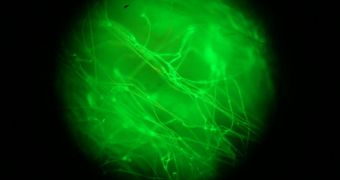In an advancement that could enable the large-scale production of super-strong, tough and flexible silk, researchers managed to manipulate silkworms in such a manner that they can now produce silk that is stronger than steel.
With the recent genetic breakthrough, a single colony of transgenic silkworms was able to produce miles of spider-silk. This means that the achievement can be replicated on a grand scale.
This was all made possible through the addition of snippets of spider genes to the genomes of average silkworms, in a process that can easily be replicated, Wired reports.
“We can make a lot more silk from the silkworm process than you could possibly make from spiders, explains Malcolm Fraser, who holds an appointment as a molecular biologist at the University of Notre Dame, in Indiana.
Spider-silk has a very large number of applications, including among others the production of bullet proof vests, surgical sutures, scaffoldings for cell growth and so on.
Doctors have long since hailed this type of silk as a super-fiber, and have constantly asked for increasingly large amounts of it to be delivered.
But this is where the problems came in. Spiders are predatory creatures, that have no difficulties resulting to cannibalism if the need arises.
As such, they cannot be grown in large numbers in confined space, which would allow scientists to obtain large amounts of their silk at an industrial scale.
But by moving the gene snippets that give the spiders' silk its properties into silkworms, researchers were able to make large-scale silk production a real possibility.
To give you an example of the scale of the achievement, consider that a single silkworm's cocoon can produce as much as one mile of fiber.
For comparison, a tapestry on display at the American Museum of Natural History (AMNH) took no less than the silk of one million spiders to produce.
“We can now make proteins that have the properties of spider silks in a commercializable platform,” Fraser goes on to explain.
The new manipulation method “allows us to custom build the threads to desired levels of flexibility, tensile strength and toughness,” Fraser reveals further.
The publication of a scientific study detailing the findings is pending.

 14 DAY TRIAL //
14 DAY TRIAL //